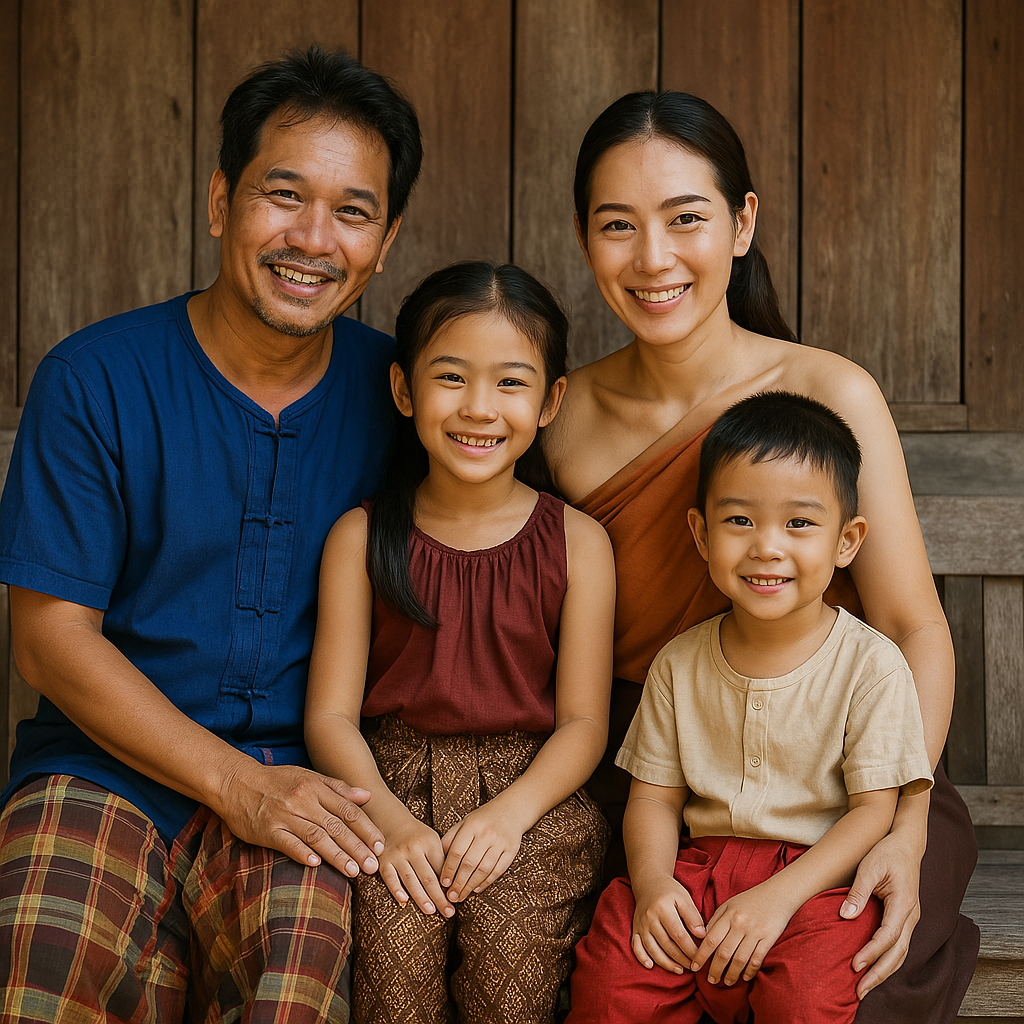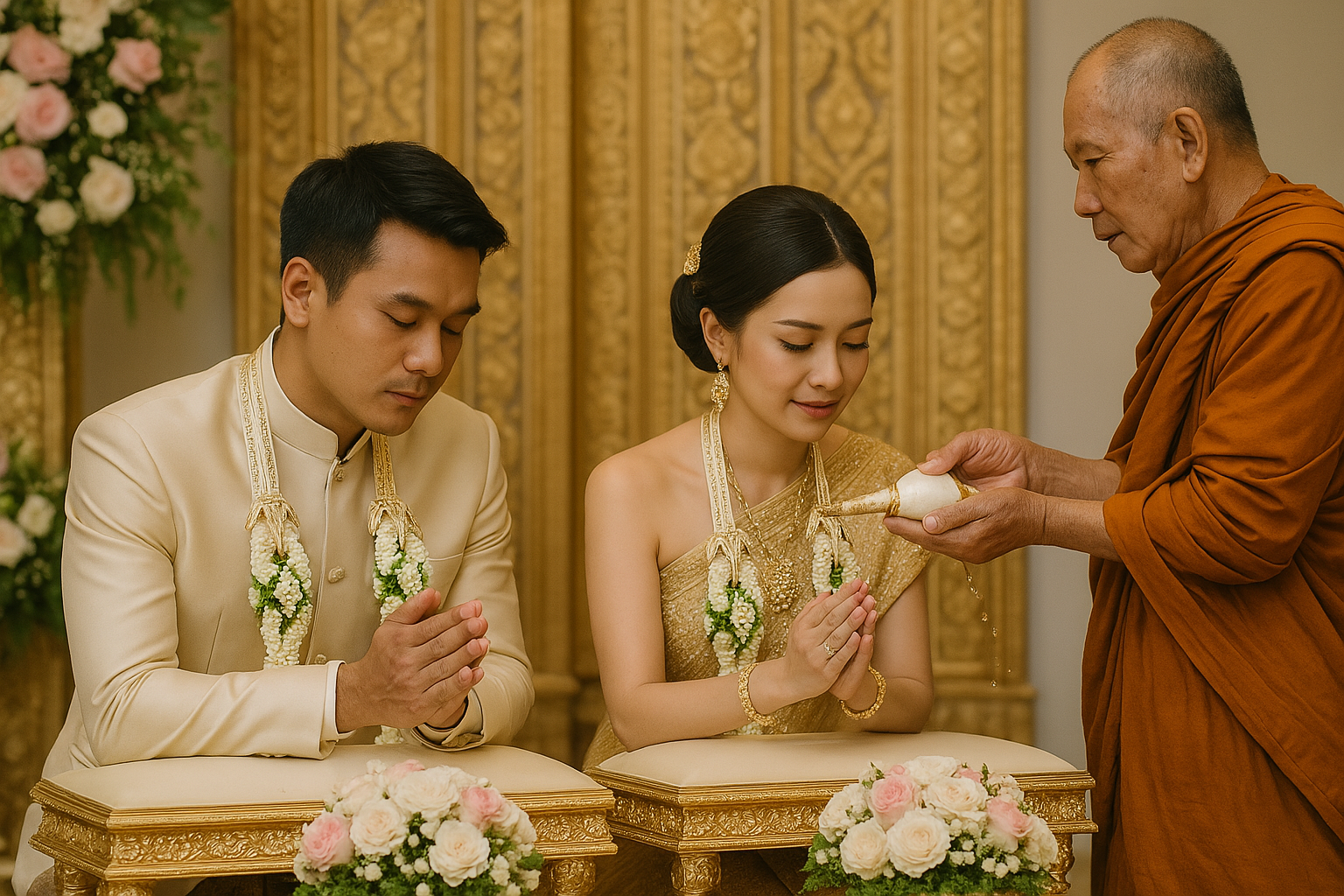
Family stands at the heart of Thai society, serving as the foundation of social structure and personal identity. Understanding Thai family values is essential for anyone building a relationship with a Thai partner, as these values profoundly influence behavior, expectations, and decision-making. This comprehensive guide explores the nuances of Thai family dynamics and traditions.
The Structure of Thai Families
Thai family structures blend traditional hierarchies with modern adaptations:
Extended Family Connections
Unlike the nuclear family model common in Western societies, Thai families often maintain strong extended family connections:
- Multiple generations frequently live together or in close proximity
- Grandparents often play significant roles in child-rearing
- Cousins, aunts, and uncles maintain close relationships throughout life
- Family gatherings and celebrations regularly include extended family members
Hierarchical Relationships
Thai family structure is distinctly hierarchical, with clearly defined roles:
- Elders are respected and their advice carries significant weight
- Younger family members show deference to older relatives
- The family patriarch/matriarch often has considerable authority in family matters
- Birth order influences responsibilities and expectations within sibling groups
Modern Adaptations
While traditional structures remain important, Thai families are evolving:
- Urban families increasingly adopt nuclear family living arrangements
- Economic necessities may require both parents to work outside the home
- Technology helps maintain family connections despite geographical distance
- Changing gender roles are gradually reshaping family dynamics
Looking to Connect with a Thai Partner?
Join Thais.Love today and meet Thai singles who value family and meaningful relationships. Create your profile and start connecting!
Sign Up NowCore Thai Family Values
Several fundamental values shape Thai family relationships and expectations:
Bunkhun (บุญคุณ) - Gratitude and Obligation
This concept of reciprocal gratitude is central to Thai family dynamics:
- Children owe a lifelong debt of gratitude to parents for giving them life and care
- Repaying this debt through respect, obedience, and support is a moral obligation
- Caring for elderly parents is considered a natural responsibility
- Failure to demonstrate proper gratitude brings shame to oneself and the family
Krengjai (เกรงใจ) - Consideration and Respect
This uniquely Thai concept influences family interactions:
- Family members avoid causing inconvenience or distress to others
- Direct confrontation is typically avoided to preserve harmony
- Consideration for others' feelings shapes communication patterns
- Decision-making often involves ensuring no one loses face
Nam Jai (น้ำใจ) - Generosity and Kindness
The "water of the heart" concept emphasizes selfless giving:
- Family members freely share resources without expectation of return
- Financial support flows to family members in need
- Hospitality and generosity are considered virtues
- Gift-giving reinforces family bonds
Family Roles and Responsibilities
Traditional roles within Thai families carry specific expectations:
Parental Roles
Parents in Thai families have clearly defined responsibilities:
- Fathers traditionally serve as providers and authority figures
- Mothers often manage household affairs and emotional nurturing
- Both parents typically emphasize children's education and moral development
- Parents commonly make significant sacrifices for their children's future
Children's Duties
Children have well-defined obligations to their parents:
- Showing respect and obedience to parents throughout life
- Achieving educational and career success to honor the family
- Contributing financially to the family when able
- Caring for parents in their old age
Sibling Relationships
Brothers and sisters in Thai families typically:
- Maintain close bonds throughout life
- Elder siblings often assume responsibility for younger ones
- Siblings commonly provide financial and emotional support to each other
- Major life decisions may involve consultation with siblings
Family Financial Dynamics
Money management in Thai families often differs from Western practices:
Resource Sharing
Financial resources are commonly viewed as family assets:
- Adult children often contribute to parents' household expenses
- Successful family members may support siblings' education or business ventures
- Family loans are common and often carry different expectations than formal loans
- Financial support flows to family members in difficulty without formal arrangements
Financial Responsibility Distribution
Specific financial roles are commonly observed:
- The highest-earning family member often shoulders greater financial responsibility
- Adult children, especially eldest daughters, frequently manage family finances
- Major purchases or investments may be discussed as family decisions
- Financial support of parents is often distributed among siblings based on ability
Family Influence on Relationships
Family values significantly impact romantic relationships with Thai partners:
Family Approval
Parental and family opinions matter substantially:
- Meeting the family is a significant milestone in Thai relationships
- Parents' approval of romantic partners carries considerable weight
- Family members' opinions may influence relationship decisions
- A partner who shows proper respect to family elders is highly valued
Integration into Family Life
Partners are expected to become part of the family structure:
- Regular participation in family gatherings and events
- Learning and respecting family traditions
- Building relationships with extended family members
- Understanding one's place in the family hierarchy
Balancing Individual and Family Needs
Thai partners navigate complex obligations:
- Family obligations may sometimes take precedence over couple time
- Financial support of family may impact couple finances
- Moving away from family can create emotional challenges
- Decision-making often considers family impact
Important Family Traditions
Seasonal celebrations and life events strengthen family bonds:
Annual Celebrations
Families gather for important festivals:
- Songkran (Thai New Year) - Family reunions and paying respect to elders
- Loy Krathong - Releasing decorated baskets on water as a family
- Chinese New Year - Important for Thai-Chinese families
- Father's and Mother's Day - Honoring parents with special ceremonies
Life Events
Family gathers for significant milestones:
- Birth ceremonies - Welcoming new family members with traditional blessings
- Ordination - When sons temporarily enter monkhood, often to make merit for parents
- Weddings - Elaborate family-centered celebrations
- Funerals - Multi-day ceremonies honoring deceased family members
Navigating Cross-Cultural Family Dynamics
Building successful relationships across cultural differences:
Understanding vs. Judgment
Approach differences with curiosity rather than criticism:
- Recognize that family systems develop from specific cultural contexts
- Avoid applying Western family norms as universal standards
- Appreciate the strengths of Thai family bonds
- Acknowledge that some aspects may feel challenging from an outside perspective
Communication Strategies
Effective cross-cultural communication about family matters:
- Discuss family expectations early in the relationship
- Ask questions to understand rather than challenge family practices
- Express concerns respectfully, recognizing cultural sensitivities
- Develop clear understanding about financial support expectations
Finding Balance
Successful cross-cultural couples find middle ground:
- Establish boundaries that respect both cultures' values
- Create new traditions that honor both backgrounds
- Negotiate compromises that acknowledge family obligations
- Build relationships with Thai family members to foster understanding
Conclusion
Thai family values center on mutual support, respect for elders, and lifelong bonds that extend beyond the nuclear family. Understanding these values is essential for building successful relationships with Thai partners, as family will inevitably play a significant role in your shared life.
While some aspects of Thai family dynamics may initially seem challenging to those from more individualistic cultures, they offer significant benefits including strong support networks, clear roles and expectations, and rich traditions that create meaning and connection across generations.
With open communication, mutual respect, and willingness to adapt, cross-cultural couples can create family systems that honor Thai traditions while incorporating elements from both partners' backgrounds, creating a unique and harmonious family culture.

